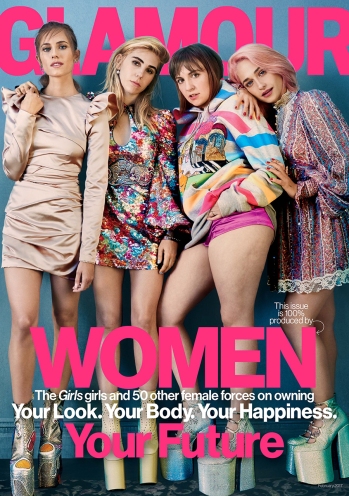When people talk about women, they always classify them into different categories.
“Oh she’s damn sexy”, “She’s so cute“, they might say about females that seem to conform to the current beauty norm. On the other hand, women that dare to be different and who consciously or unconsciously choose to defy beauty ideals are heavily criticised. Our western culture deems being skinny, tall and tanned as the ultimate key to physical attractiveness. If you look on different parts in the world, these ideals, however, differ considerably. Arabian countries prefer a more curvy figure, Chinese people diligently avoid the sun because they worship delicate white skin. There is quite an interesting survey conducted by ‘Superdrug Online Doctors’ that deals with exactly this topic. 18 designers from all around the world were asked to create a “perfect woman” with regard to their home country’s beauty ideal. The result can be found here. This project sought to expose unattainable demands on women – because “widely held perceptions of beauty and perfection can have a deep and lasting cultural impact on both women and men”, the official press release said.
So what can we learn from this? First, that it is not only unhealthy but totally impossible to reach these goals. The Chinese “Aphrodite”, for example, resembles rather a bizarre anorexic doll than a healthy and happy woman. Italy’s Venus is the standard western catwalk model – long legs, thin arms, slim waist. Whereas in Egypt, apparently, skinny women would not be admired very much. No, because there females need to have big breasts and curvy hips. The result is a somewhat ludicrous hourglass figure. After looking at these pictures I was left with quite a bitter feeling. What is wrong with our modern society? Why do we always and everywhere have to set up standards that women are supposed to achieve? Apparently it is not enough to just “be” and work on yourself as a person. More often than not, traits like intelligence and open-mindedness are neglected in favour of beauty.
This is not to say that I don’t care about appearances at all. I do. I don’t think that there is anyone in the world who does not look oneself with critical eyes from time to time. It is totally natural. But this survey is just one more example that beauty ideals become more and more ridiculous these days. Women are expected to surrender to appearance norms set up by the media. But as these pictures reveal, it is impossible to meet all varying ideals at the same time. Just imagine if your job obliged you to travel around the world. So after arriving in China you have to stick to a strict diet to become as thin as Barbie? And what if Egypt would be your next destiny? You suddenly have to stuff food inside your body to gain weight – everything in the pursuit of beauty? Even thinking about it is ridiculous.
History shows us that there always have been ideals of female beauty. Artworks depict that these standards often change quicker than one can blink.
This slideshow requires JavaScript.
One day, one of my ex-boyfriends told me that I was not curvy enough – I was doing quite a lot of sports at this time and tried to eat healthy. But apparently he didn’t like that too much. “It would be nice if you had bigger boobs and a bigger booty” – these were basically his words. As an example, he showed me a picture of Kylie Jenner’s hourglass figure. Back then, I just laughed at him. I didn’t take it too seriously – because after all, it was my body. My body, my decision. I just thought: Okay, he’s a guy. Guys sometimes have weird perceptions. But he didn’t stop. “Why don’t you wear more make-up?”, was the next issue, followed by “You should dye your hair light blonde”. So more and more suggestions about how I could improve my looks came up. One time, when we were at the drugstore, he basically dragged me to the beauty department to select some products for me that were supposed to be “good for me”.
When I think back about this episode, I’m at the same time ashamed and proud of myself. Ashamed, because it took me quite a long time to realise that he had no right to talk to me that way. Ashamed, because I could not see at first that he was clearly misogynic. On the other hand, I never even thought about surrendering to his demands. I never considered changing my looks just for a guy. I am who I am – and if a boy does not like it, it’s his own fault. In fact, his ridiculous suggestions just made me more stubborn – I would even hit the gym more often (in fact, I haven’t been as fit since that time) and have make-up free days. This episode taught me a very important lesson: Although people might tell me to change my appearance, in the end it’s always my decision. I have the power to decide whether I want to have black or blonde hair or whether I wear make-up or not. If I decided I wanted to dye my hair pink or get a hundred different tattoos on my body, so be it. It is not up to others to tell me what I should look like. You cannot please everyone anyway – so this person thinks I’m too skinny. Okay. The next person would deem me as too thick. I clearly don’t have the complexion of a supermodel and neither do I have perfect curves – so what? It is impossible to fulfil all beauty ideals anyway.
These days, social media is flooded with women posting private workout and bikini pictures. Of course it can also be an empowering action – they show that they are confident about their body and want to encourage other women to do so, too. But especially on young girls it might have a rather negative effect. The danger lies in actually forgetting what a healthy body looks like.
Celebrities might me the most affected victims of the whole beauty debate. Last Sunday Lady Gaga did an amazing show at the Super Bowl – including flying through the air, changing her costumes mid-performance and basically rocking her ass off. Although she was being congratulated for her show, people soon started to criticise her for one certain thing: namely for showing her belly. “Tried to enjoy @ladygaga’s performance, was distracted by the flab on her stomach swinging around”, one user lamented. Another bodyshamer advised the pop singer to “work on her abs” as her belly was apparently “flopping around”. After reading these tweets, I thought: WTF??! So this power girl just put her whole heart and soul into this show and all people are able to talk about is her belly?
When I saw the “offending” picture, I couldn’t help but laugh. So she showed some tiny, tiny bit of flesh over her waistband. So what? Is she therefore endangered to become obese? As far as I could see, she is fit as hell – or how else could she have completed this physically demanding 12 minute show? Are all women now expected to have perfectly flat bellies just because western society claims it as the beauty ideal? So I might have a relatively flat stomach in the morning – due to digestion during the night. But if I would like to keep it that way, I would only be allowed to eat the tiniest amount of food during the day. Do I want to do that? No. Because for me, food means life quality. Would I ever sacrifice food for a perfectly flat stomach? Definitely not.
Once again, Lady Gaga replied with the perfect words. On Instagram, she wrote:
I heard my body is a topic of conversation so I wanted to say, I’m proud of my body and you should be proud of yours too. No matter who you are or what you do. I could give you a million reasons why you don’t need to cater to anyone or anything to succeed. Be you, and be relentlessly you. That’s the stuff of champions. thank you so much everyone for supporting me. I love you guys. Xoxo, gaga
Lady Gaga is not the only star who decided to speak out against the unrealistic standards of beauty. Lily Collins admitted that she has always had complexes because of her rather “bold” eyebrows. In an interview with ‘InStyle.com’, she recalled the tough time she had as a teenager:
I wanted to fit in and I think we all want to fit in at a young age, and we alter things about ourselves that we think are different to fit in better, and one of those things was my eyebrows. They were so bold they were very big on my face, and as a kid I wanted to change that. So, I took it upon myself to hack them away and I thought I had done such a great job. And my mum was looking at me at dinner one night and said ‘What did you do?’ And I thought ‘I know, they look amazing right?’ And she proceeded to tell me ‘You need to accept the quirky things that make you different and what make you beautiful, it’s the things that stand out that make you unique, and allow people to appreciate that.’
The actress confessed that it took her a very long time to embrace all the attributes that make her unique and beautiful in her own way. As Lily declared, only recently has she realised that perfection is actually “unattainable”. When I read her words, it felt like she was expressing exactly what I was feeling:
The older you get, the more you see that people you admire and find beautiful have different things about them that make them them. So, I think it’s really important whether its characteristics of your personality, or physical characteristics that define who you are, different is beautiful.”
Different is beautiful – this might be one of the most important truths that exist in modern life. In democratic societies we have the freedom to be who we are – at least in theory. More often than not, however, we limit our lives and possibilities ourselves by trying to please others. But in the end, we have to ask ourselves: Is this really me? Should I really let myself be defined by unachievable standards set up by society? It would certainly be quite sad to do so. The world would be a far more boring and colourless place if we would surrender what makes us special.


